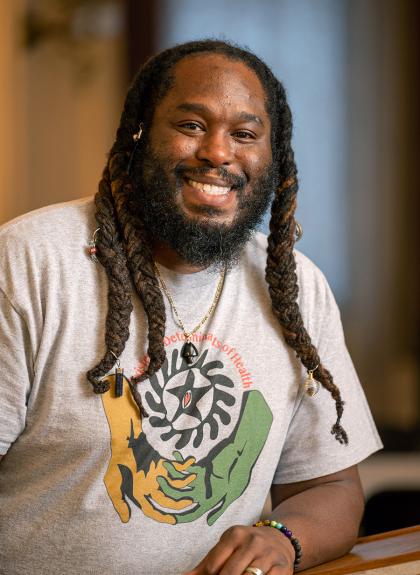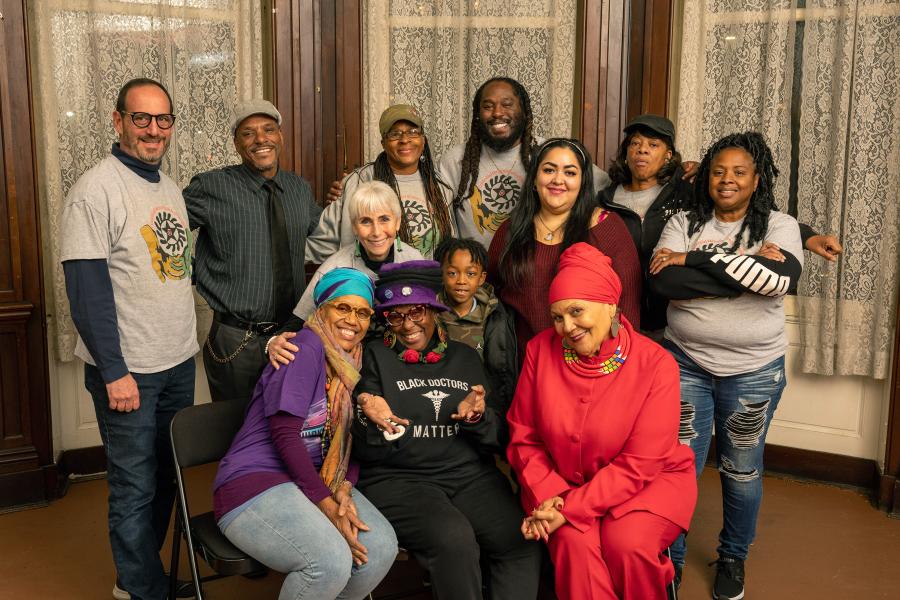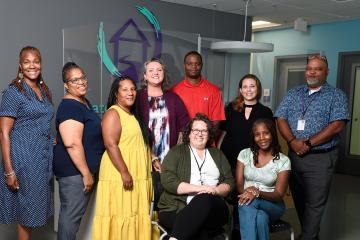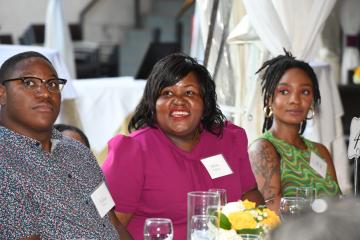In public health circles, the social determinants of health are well known. They are conditions where we live, work, learn, and play that affect health and quality of life—things like education, employment, health care, and access to safe housing, transportation, and nutritious foods.
Inspired by this, David Fakunle coined a new term: the existential determinants of health. As he explained, "We are all humans, and we all want the same things."
Acknowledgement. Appreciation. Respect. Understanding. Love. "Everything we do is out of the desire to achieve those things," he said.
Fakunle is the executive director of WombWork Productions, a Baltimore-based social change performing arts company. He also earned a PhD in mental health from the Johns Hopkins Bloomberg School of Public Health and is an associate faculty member there. Combining his passion for performing arts and storytelling and his public health expertise, Fakunle helped launch the Existential Determinants of Health Initiative with a grant from JHU's Innovation Fund for Community Safety.
The Innovation Fund is a four-year, $6 million initiative to support community programs in Baltimore that aim to address the root causes of violence in the city. WombWork, in partnership with Virtues Matter, is one of nine grant recipients.
A light bulb went off
Fakunle has been a performer since childhood and involved with WombWork since he was a teenager. While performing with the company during his doctoral studies, a light bulb went off. "WombWork has been a public health organization the entire time," he said. "I just never realized it."
WombWork creates a space where you can express yourself creatively, tell your story unapologetically, be seen and valued for you who are, and find the support of a community going through similar struggles. This helps participants heal and address their trauma. It just happens to be through performing arts.

Image caption: David Fakunle
Image credit: Mike Ciesielski / For Johns Hopkins University
"We were looking for unique projects," said Shatabdi Patel, program manager for the Innovation Fund at Hopkins. "We were open to trying something new because what's been done hasn't been effective enough in reducing violence."
For the first year of the initiative, a group of 25 participants who have dealt with substance abuse disorder met weekly to work on their healing and their performances. Topics covered in the program curriculum addressed physical, mental, spiritual, and financial health.
"There are many ways we can try to meet those basic human needs," Fakunle said. "We can do it in healthy ways. Sometimes we do it in unhealthy ways. Substance Use Disorder can be an attempt to fill those needs. We're trying to create healthy, beneficial, collaborative ways to achieve human desires."
For many, use disorders cultivate a path toward violence—either as a perpetrator, or often as a victim. Existential Determinants of Health, or EDOH, helps reduce opportunities for violence, taking people off the streets and out of situations where they can be taken advantage of.
There is evidence of the effectiveness of an arts-based approach, and it also happens to involve WombWork and Johns Hopkins. In 2001, WombWork partnered with the JHU School of Nursing on an arts-based initiative for the prevention of violence against women and girls. This was included in a five-year study by the Centers for Disease Control that confirmed the arts-based model was effective in reducing violent behavior among youth in four urban middle schools.
Finding meaning
Arjun Chanmugam, vice chair of emergency medicine for the Johns Hopkins University School of Medicine and professor of emergency medicine, is the faculty advisor for the EDOH. program. Chanmugam cited notable thinkers from his psychiatry textbook that support the program's ideals: Aristotle's belief that the greatest virtue we can achieve is to follow what we think is right. And Viktor Frankl's thought that finding meaning, and doing things that have meaning for us, can improve physical and mental health.
"I believe that everybody has a superpower, and if you allow people to perform their superpower—whatever it is—it brings happiness and success," Chanmugam said. "For people in disadvantaged neighborhoods or those struggling from adverse events, it's harder to discover your superpower. There are ways we can help everybody get to their full potential, and that's what Existential Determinants of Health is all about."
Chanmugam said he was overwhelmed by the success of the first cohort, which finished year one this summer.
Image caption: A conversation with David Fakunle, executive director of Wombwork Productions
"They exceeded my expectations," he said. "People who were initially withdrawn and reluctant to interact were remarkably engaged. They were willing to reach out and help others who are having similar problems."
This hits two of the program's goals, according to Chanmugam. One was to help participants become leaders in the community. The other was to solve the community's problems from within, rather than someone coming from outside and telling them what they should do.
In the program's second year, some alumni will mentor and help teach the second cohort, which is currently being recruited. "That's a big deal for me. It means they really believe in it," Chanmugam said. "And Johns Hopkins believes in it. It's inspiring to know our leadership is so committed to the community. I want to thank President [Ron] Daniels and our leadership for their support of the Innovation Fund."
Powerful performances
The initiative also included three successfully produced performances in year one. One cohort member was a visual artist more so than a performer, using drawings with powerful words about his addiction. At the final street festival performance, he had his own showcase. One of his pieces was blown up into a banner for his table display, and he sold a few of his works.
Others shared their stories—their struggles and their triumphs—on stage.
"The audience was in shock," Patel said. "The performances were incredibly moving. They talked about addiction, used music and dancing. We didn't expect them to be so raw and open about their struggles. There were a lot of tears, on stage and in the crowd."
Fakunle said you could see the performers' strength and power when they told their stories, and how much better they felt about who they were as human beings.
"They no longer define themselves exclusively by their addiction," he said. "They are mothers, father, sons, daughters, and friends. They are human, and they want the same things we all want."
To be acknowledged, appreciated, respected, understood, and loved.
Posted in University News, Community










